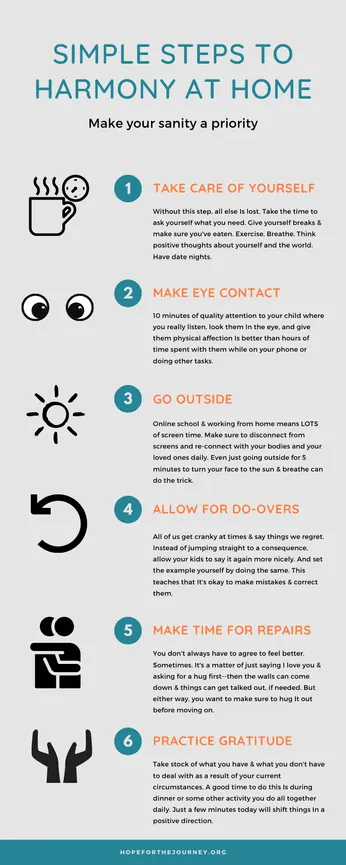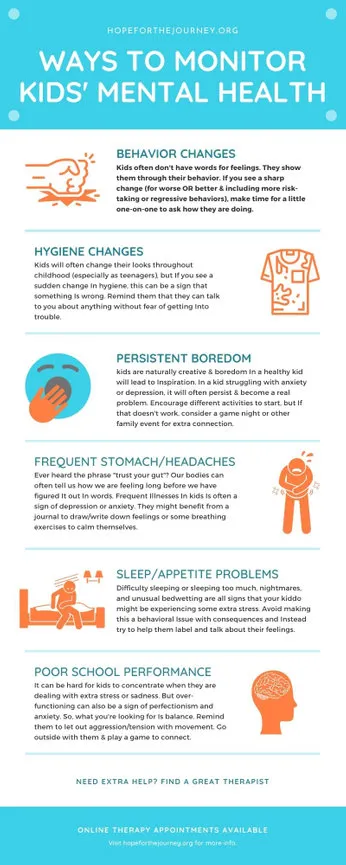Parenting SOS for
the Age of COVID
Oct 23, 2020 | By: Hope for the Journey

I’m convinced there is a special place in heaven being carved out for working parents of toddlers right now. But really, all parents are being challenged in new and ever-changing ways with virtual school, kids stuck at home, and the many worries about health and safety that have become commonplace during 2020.
As a parent and child therapist in Texas, I know the struggle is real, ya’ll!
That’s why we’ve put together some helpful resources for you to take the sting out of COVID-19 and help you feel whole again.
Parenting in 2020 Requires A New Level of Resiliency
Parents are balancing working from home and parenting full time. Or NOT working at all and struggling to put food on the table while needing to maintain internet services for the kids to be able to attend school. We have limited access to our normal stress relievers and are being forced to spend WAY more time than normal around our families.
Because of all this stress building, it is no surprise that conflict is up and tempers are flaring. Kids are experiencing this stress, too, and calls for counseling are increasing by the day–especially since school has started back.
If you would like some concrete things to do that help build grit and resiliency, sign up here for our free weekly video series called Get Your Grit. Once you enter your email, you’ll get a video in your inbox weekly for 10 weeks. Simply watch the 2-minute video, and try out the skill throughout the week. See what works and what doesn’t. See if making any small tweaks to it might help serve your life better. The point is just to start doing some things that help.
How Parents Can Create More Peace at Home
Creating peace in your home and returning to a sense of balance takes just a little consistent effort, but pays off in spades. We created an infographic to help get you started. We encourage you to take these ideas and build on them.

Take note of what works to diffuse tension and add fun back to your daily routine. Then do more of that. Be creative and add variety. If something is working, think of 3 varieties of the same activity. For example, if eating together tends to bring you together, then have a fancy dress up dinner one night, have an appetizer night where everyone makes their own contribution, and have a picnic outside another night.
Signs of Emotional and Mental Health Problems in Kids
We are all starting to feel the full weight of sheltering at home and disruption to our normal routines–kids also. One of the hardest parts for kids and parents alike is the sense of isolation that has started to mount. Additionally, the sharp increase in the number of screen time hours kids are getting is causing a decrease in physical activity (which naturally helps to regulate mood) and an increase in strain on eyes.
So, if you’re like most parents, at some point you might start wondering when that daily tantrum has slipped out of normal and into something else. Obviously, if you are concerned, consider scheduling a mental health assessment with a child therapist. Or, seeking therapy for parents for more support. But, as another helpful tool, we’ve also created another infographic to help you identify some warning signs of problems.

Self-Care is Critical
One of the most important things you can do during these challenging days is find ways to stay connected and learn what works to help you calm. When you take care of yourself, you can take care of your children so much better. For this reason, we’ve also put together an 8-week online mindfulness group that will begin at the end of September and end just before Thanksgiving. The idea is to get you practicing mindfulness in ways that make sense with your busy schedule. This way, as you enter into this unprecedented holiday season, you will have the ability to center yourself.
These are skills you can then model to your children and also actively teach to them.
What is Mindfulness?
Mindfulness is the ability to lovingly observe your experience. This means learning to really be in the moment without worry or self-criticism. It means enjoying sensory experiences that are readily available during COVID–like a walk in the evening or a nice bath. We all know what it’s like to go on that walk and be replaying that argument over and over. This is not mindfulness, and while it may be good movement for your body, you would have a completely different experience during the walk if you were able to practice mindfulness.
Mindfulness takes regular practice, but it doesn’t take a lot of time, so it’s perfect for busy parents. If interested in learning more, you can find out more information about our group and get your spot here.
Parenting in 2020 takes extra support and resources, so we hope this post has been helpful. As always, if you want more one-on-one help or have questions about whether or not therapy for parents would be helpful for you, we’re here to help.
